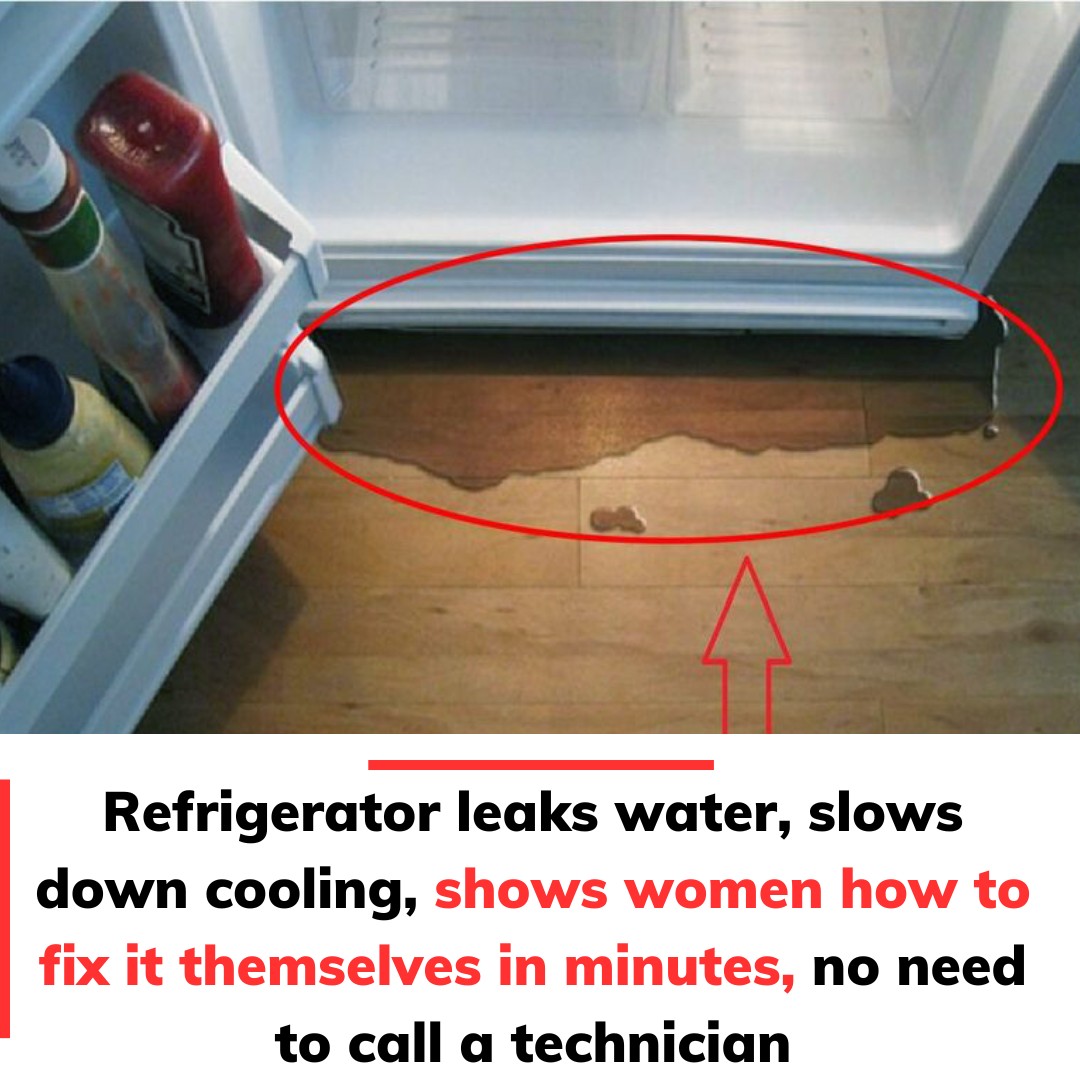Refrigerators are an essential appliance in every household, working around the clock to keep food fresh and safe. However, like any frequently used appliance, they are not immune to occasional problems. Two of the most common issues that homeowners encounter are water leaks and slow cooling. Both problems can disrupt the efficiency of the refrigerator, lead to food spoilage, and, if ignored, result in costly repairs. Fortunately, many of these issues stem from simple causes and can often be resolved at home without the need for professional assistance.

Before you call a technician and incur unnecessary expenses, it’s worth exploring the most common reasons behind these problems. With a bit of troubleshooting and a few quick fixes, you might be able to restore your refrigerator to optimal performance. Let’s break down the potential causes of water leaks and slow cooling, along with practical solutions for each issue.
1. Water Leaking from the Refrigerator Compartment
A common cause of water leaks in the refrigerator compartment is overcrowding. Many people tend to pack their refrigerators tightly with food, assuming it will help them save time and reduce grocery store trips. However, overloading the fridge can block air vents, disrupt airflow, and cause cooling inefficiencies. Additionally, placing freshly washed fruits, vegetables, or meats inside the refrigerator without properly drying them can lead to excess moisture buildup. Over time, this moisture can drip and pool at the bottom of the compartment, creating a mess and potentially contaminating other food items.
Quick Fix:
Always drain excess water from washed produce and meats before placing them in the fridge. Use paper towels to pat them dry, or wrap them securely in plastic wrap or ziplock bags. Avoid overpacking the refrigerator and ensure that air vents are not obstructed by food items. Proper airflow is essential for maintaining consistent cooling and preventing moisture buildup. By keeping your refrigerator organized and moisture-free, you can avoid unnecessary leaks and ensure efficient cooling.
2. Water Leaking from the Freezer Compartment
Water leaks in the freezer are typically caused by two primary culprits: blocked air vents and damaged door gaskets. Overcrowding the freezer can obstruct airflow, leading to inconsistent temperatures and the formation of excess ice. As the ice begins to melt, it can result in water leaks. Additionally, if the freezer door gasket is cracked, loose, or worn out, it won’t seal properly. This allows warm air to enter the freezer, causing ice buildup and eventual water leakage.
Quick Fix:
First, check if the freezer door is sealing properly. Inspect the gasket for any signs of cracks, looseness, or damage. If the gasket is faulty, it should be replaced immediately. Next, rearrange the contents of your freezer, ensuring that air vents remain unobstructed. Avoid cramming too many items into the freezer, as overcrowding restricts airflow and reduces efficiency. These simple adjustments can often resolve water leaks without requiring professional intervention.
3. Water Leaking onto the Floor from the Drain Pan
Sometimes, the source of a water leak isn’t inside the refrigerator or freezer but underneath it. The drain pan, located at the bottom or back of the refrigerator, collects condensation and allows it to evaporate naturally. However, if the pan is cracked, damaged, or misaligned, it can cause water to spill onto your kitchen floor. Similarly, a loose or broken water supply pipe can also contribute to this issue.
Quick Fix:
Start by unplugging your refrigerator to ensure safety. Carefully slide out the drain pan and inspect it for cracks or damage. If it’s compromised, replace it with a new one. Check the water supply pipe for any signs of looseness, blockages, or damage. If you notice any issues, replace the pipe as needed. If both the drain pan and water pipe seem intact but the leak persists, it’s time to call in a professional technician for further investigation.
Preventive Maintenance Tips for a Healthy Refrigerator
Fixing leaks is one thing, but preventing them is even more important. Regular maintenance helps ensure your refrigerator operates efficiently and reduces the likelihood of recurring issues. Here are a few preventive tips:
- Clean Your Refrigerator Regularly: Remove expired food, wipe down compartments, and clean spills immediately to prevent mold and unpleasant odors.
- Inspect Door Seals: Check the gaskets periodically for cracks, dirt, or damage. A proper seal is essential for maintaining consistent temperatures.
- Avoid Overpacking: Ensure both refrigerator and freezer compartments are well-organized and not overcrowded. Proper airflow prevents cooling inefficiencies.
- Clear Air Vents: Keep air vents unobstructed to allow even airflow throughout the appliance.
These simple habits will not only prevent common refrigerator issues but also reduce energy consumption and extend the appliance’s lifespan.
When to Call a Professional Technician
While many refrigerator problems can be resolved with basic troubleshooting, some require professional expertise. If you’ve followed the above steps and still notice persistent water leaks, inconsistent cooling, or unusual noises, it’s time to call a technician. Professionals can conduct diagnostic tests, identify internal damage, and carry out necessary repairs to restore your refrigerator’s performance.
The Bottom Line
Water leaks and slow cooling are common refrigerator issues, but they are often caused by simple oversights such as blocked air vents, poor organization, or worn-out door seals. By addressing these problems promptly and performing regular maintenance, you can avoid expensive repairs and ensure your refrigerator operates efficiently for years to come.
The key takeaway? Preventive care is the best way to protect your refrigerator from unexpected breakdowns. A little attention to detail and consistent upkeep will save you time, money, and unnecessary stress in the long run. Don’t wait until a minor issue turns into a major repair—take action today to keep your refrigerator running smoothly and your food fresh and safe.





